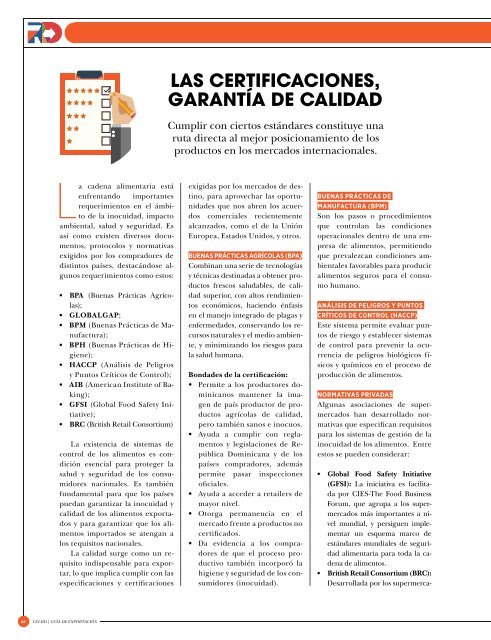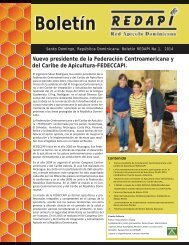Exportación
290Ec5R
290Ec5R
Create successful ePaper yourself
Turn your PDF publications into a flip-book with our unique Google optimized e-Paper software.
La cadena alimentaria está<br />
enfrentando importantes<br />
requerimientos en el ámbito<br />
de la inocuidad, impacto<br />
ambiental, salud y seguridad. Es<br />
así como existen diversos documentos,<br />
protocolos y normativas<br />
exigidos por los compradores de<br />
distintos países, destacándose algunos<br />
requerimientos como estos:<br />
• BPA (Buenas Prácticas Agrícolas);<br />
• GLOBALGAP;<br />
• BPM (Buenas Prácticas de Manufactura);<br />
• BPH (Buenas Prácticas de Higiene);<br />
• HACCP (Análisis de Peligros<br />
y Puntos Críticos de Control);<br />
• AIB (American Institute of Baking);<br />
• GFSI (Global Food Safety Initiative);<br />
• BRC (British Retail Consortium)<br />
La existencia de sistemas de<br />
control de los alimentos es condición<br />
esencial para proteger la<br />
salud y seguridad de los consumidores<br />
nacionales. Es también<br />
fundamental para que los países<br />
puedan garantizar la inocuidad y<br />
calidad de los alimentos exportados<br />
y para garantizar que los alimentos<br />
importados se atengan a<br />
los requisitos nacionales.<br />
La calidad surge como un requisito<br />
indispensable para exportar,<br />
lo que implica cumplir con las<br />
especificaciones y certificaciones<br />
LAS CERTIFICACIONES,<br />
GARANTÍA DE CALIDAD<br />
Cumplir con ciertos estándares constituye una<br />
ruta directa al mejor posicionamiento de los<br />
productos en los mercados internacionales.<br />
exigidas por los mercados de destino,<br />
para aprovechar las oportunidades<br />
que nos abren los acuerdos<br />
comerciales recientemente<br />
alcanzados, como el de la Unión<br />
Europea, Estados Unidos, y otros.<br />
BUENAS PRÁCTICAS AGRÍCOLAS (BPA)<br />
Combinan una serie de tecnologías<br />
y técnicas destinadas a obtener productos<br />
frescos saludables, de calidad<br />
superior, con altos rendimientos<br />
económicos, haciendo énfasis<br />
en el manejo integrado de plagas y<br />
enfermedades, conservando los recursos<br />
naturales y el medio ambiente,<br />
y minimizando los riesgos para<br />
la salud humana.<br />
Bondades de la certificación:<br />
• Permite a los productores dominicanos<br />
mantener la imagen<br />
de país productor de productos<br />
agrícolas de calidad,<br />
pero también sanos e inocuos.<br />
• Ayuda a cumplir con reglamentos<br />
y legislaciones de República<br />
Dominicana y de los<br />
países compradores, además<br />
permite pasar inspecciones<br />
oficiales.<br />
• Ayuda a acceder a retailers de<br />
mayor nivel.<br />
• Otorga permanencia en el<br />
mercado frente a productos no<br />
certificados.<br />
• Da evidencia a los compradores<br />
de que el proceso productivo<br />
también incorporó la<br />
higiene y seguridad de los consumidores<br />
(inocuidad).<br />
BUENAS PRÁCTICAS DE<br />
MANUFACTURA (BPM)<br />
Son los pasos o procedimientos<br />
que controlan las condiciones<br />
operacionales dentro de una empresa<br />
de alimentos, permitiendo<br />
que prevalezcan condiciones ambientales<br />
favorables para producir<br />
alimentos seguros para el consumo<br />
humano.<br />
ANÁLISIS DE PELIGROS Y PUNTOS<br />
CRÍTICOS DE CONTROL (HACCP)<br />
Este sistema permite evaluar puntos<br />
de riesgo y establecer sistemas<br />
de control para prevenir la ocurrencia<br />
de peligros biológicos físicos<br />
y químicos en el proceso de<br />
producción de alimentos.<br />
NORMATIVAS PRIVADAS<br />
Algunas asociaciones de supermercados<br />
han desarrollado normativas<br />
que especifican requisitos<br />
para los sistemas de gestión de la<br />
inocuidad de los alimentos. Entre<br />
estos se pueden considerar:<br />
• Global Food Safety Initiative<br />
(GFSI): La iniciativa es facilitada<br />
por CIES-The Food Business<br />
Forum, que agrupa a los supermercados<br />
más importantes a nivel<br />
mundial, y persiguen implementar<br />
un esquema marco de<br />
estándares mundiales de seguridad<br />
alimentaria para toda la cadena<br />
de alimentos.<br />
• British Retail Consortium (BRC):<br />
Desarrollada por los supermerca-<br />
dos ingleses, establece requisitos<br />
para los sistemas de gestión de<br />
calidad e inocuidad. Requiere<br />
la adopción del sistema HAC-<br />
CP, mantener un sistema documentado<br />
de Gestión de Calidad,<br />
implementar las BPM y contar<br />
con un sistema de control de<br />
producto, proceso y personal.<br />
• Global G.A.P.: Normativa de<br />
Buenas Prácticas Agrícolas<br />
acordada por las cadenas más<br />
importantes de supermercados<br />
europeos, reunidas bajo la denominación<br />
EUREP (Euro-Retailer<br />
Produce Working Group),<br />
la cual protocoliza el proceso de<br />
producción de fruta fresca con<br />
destino a esta agrupación de supermercados.<br />
ENGLISH<br />
CERTIFICATIONS:<br />
QUALITY ASSURANCE<br />
Complying with certain standards<br />
constitutes a sure way to position<br />
products in international markets.<br />
The food chain is going through important<br />
requirements in the areas of<br />
safety standards, environmental impact,<br />
health and security. Thus, there<br />
are various documents, protocols and<br />
standards required by buyers from different<br />
countries, some requirements<br />
being:<br />
• GAP (Good Agricultural Practices);<br />
• GLOBAL G.A.P.;<br />
• GMP (Good Manufacturing Practices);<br />
• GHP (Good Hygiene Practices);<br />
• HACCP (Hazard Analysis and Critical<br />
Points Control);<br />
• AIB (American Institute of Baking);<br />
• GFSI (Global Food Safety Initiative);<br />
• BRC (British Retail Consortium)<br />
Systems of food control are essential<br />
conditions to protect the health and<br />
safety of domestic consumers. It is<br />
also essential for countries to ensure<br />
the safety and quality of exported<br />
food and to ensure that imported food<br />
comply with national requirements.<br />
Quality emerges as an indispensable<br />
export requirement, which implies<br />
meeting specifications and certifications<br />
required by destination markets,<br />
to seize the opportunities open trade<br />
agreements from the European Union,<br />
the United States, and other countries<br />
offer.<br />
Good Agricultural Practice (GAP)<br />
Combines a number of technologies<br />
and techniques to obtain fresh<br />
healthy products, of superior quality,<br />
with high economic returns, and<br />
an emphasis on integrated pest and<br />
disease management, conservation<br />
of natural resources and the environment,<br />
and minimizing human health<br />
risks.<br />
Benefits of the Certification:<br />
• Allows Dominican producers to maintain<br />
the image of a country producing<br />
quality, healthy and safe agricultural<br />
products.<br />
• Helps to comply with regulations and<br />
laws of the Dominican Republic and<br />
buyer countries, and to pass official<br />
inspections.<br />
• Helps to access higher level retailers.<br />
• Confers permanency in the market<br />
over uncertified products.<br />
• Offers buyers evidence that the production<br />
process also incorporated the<br />
health and safety of consumers.<br />
Good Manufacturing Practices<br />
(GMP)<br />
Groups the steps or procedures<br />
that control the operational conditions<br />
within a food company, allowing<br />
favorable environmental conditions<br />
to produce food safe for human consumption.<br />
Hazard Analysis and Critical Points<br />
Control (HACCP)<br />
This system allows the evaluation<br />
of risk points and the establishment<br />
of control systems to prevent physical<br />
and chemical biological hazards in the<br />
food production process.<br />
Private policy<br />
Some supermarket associations<br />
have developed regulations that specify<br />
requirements for management of<br />
food safety systems. These can be<br />
considered:<br />
Global Food Safety Initiative (GFSI)<br />
The initiative is provided by CIESthe<br />
Food Business Forum, which<br />
brings together the world’s most important<br />
supermarkets, and seeks to<br />
implement a framework of global food<br />
safety standards for every link in the<br />
food chain.<br />
British Retail Consortium (BRC)<br />
Developed by the British supermarkets,<br />
it establishes requirements<br />
for quality and safety management<br />
systems. It requires the adoption of<br />
the HACCP system, maintaining a documented<br />
quality management system,<br />
implementation of the BPM and count<br />
with a control system for product, process<br />
and personnel.<br />
Global G.A.P.<br />
Standards of Good Agricultural<br />
Practice agreed by major European<br />
supermarket chains, gathered under<br />
the name EUREP (Euro-Retailer Produce<br />
Working Group), which logs the<br />
process of production of fresh fruit intended<br />
for this group of supermarkets.<br />
64 CEI-RD | GUÍA DE EXPORTACIÓN<br />
CEI-RD | EXPORT GUIDE 65



